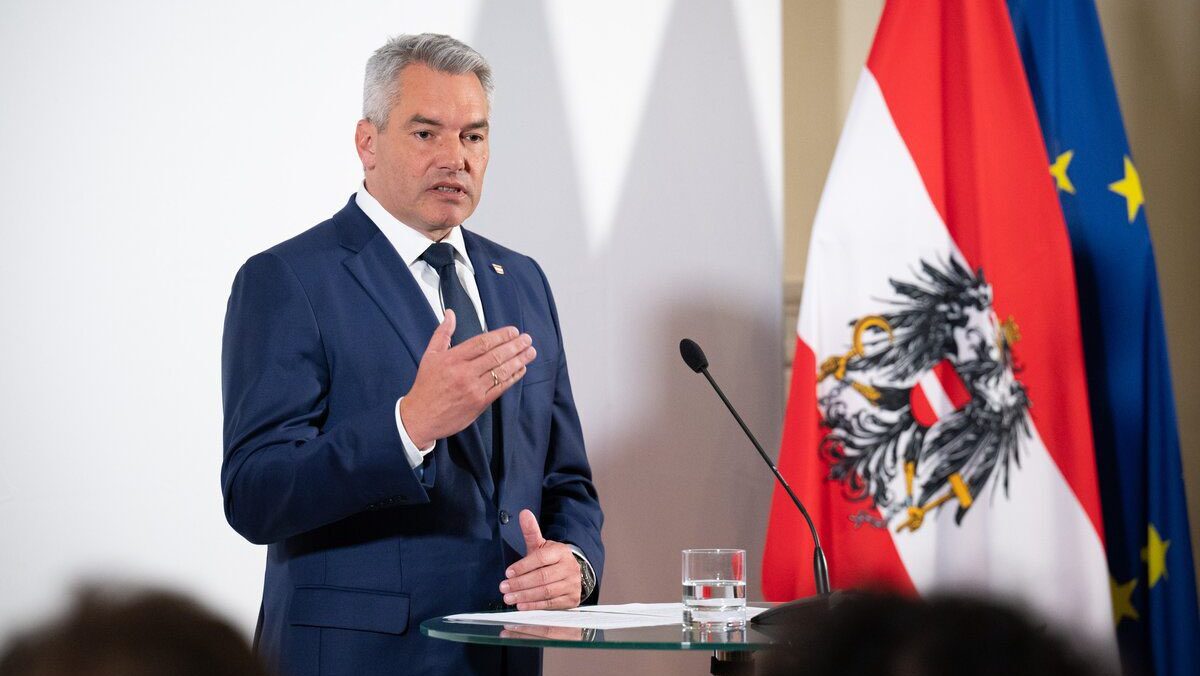
Austrian chancellor Karl Nehammer
Photo: @karlnehammer on X, 5 November 2024
Austrians won’t have a government under the Christmas tree, the three party leaders who have been trying to form a coalition announced at a press conference.
Instead of opting for his natural ally, the right-wing Freedom Party (FPÖ), with whom he would have had a comfortable majority in parliament, Karl Nehammer, the leader of the centre-right People’s Party (ÖVP) is trying to negotiate a three-way deal with the Social Democrats (SPÖ) and the liberal NEOS party. But, according to Austrian media reports, the parties are struggling to find a compromise.
Despite winning the national elections in September, the anti-globalist FPÖ party was shunned by all the other parties. Instead, the country’s president, Alexander Van der Bellen, tasked the head of the second-place ÖVP, Karl Nehammer, with the job of forming a government.
A government consisting of ÖVP, SPÖ, and NEOS would be Austria’s first three-party government since 1949.
Talks between the three parties began exactly a month ago, and their leaders attempted to radiate optimism at their press conference on Tuesday, December 17th.
“There will be no government under the Christmas tree, but there is a shared will and ambition to make progress this week,” NEOS leader Beate Meinl-Reisinger said. Karl Nehammer spoke of a “good and constructive process,” and said that negotiations were “entering the intensive phase,” and will continue beyond the turn of the year.
Wir haben in den letzten Wochen in vielen wichtigen Bereichen große Fortschritte erzielt, in den Verhandlungsgruppen wurde hervorragend gearbeitet. Jetzt geht es in die entscheidende Phase. In den nächsten Tagen wird weiterverhandelt, selbstverständlich auch in den… pic.twitter.com/eIsjpl4n1N
— Karl Nehammer (@karlnehammer) December 17, 2024
The party leaders did not give away much on what was causing the delay in reaching a compromise, but reducing the budget deficit is one of the main issues. According to predictions, the deficit will swell to 3.7% of GDP this year, breaching the EU’s 3% limit, and grow to 4% or more next year. Poor growth in trading partners such as Germany and low consumer confidence have slowed Austria’s economic output, which is set to shrink for the second year.
The European Commission estimates that Austria must realistically save between €12 billion and €15 billion over the next four years.
While the ÖVP and NEOS are already in agreement on central issues, Andreas Babler, the leader of the SPÖ, a self-proclaimed Marxist, wants higher taxes to plug the gigantic budget hole—a proposal the other two parties find hard to swallow.
According to daily Österreich, real progress has been made on many issues, but with regards to the economy, the budget and inflation, talks have come to a standstill, with the Social Democrats the most unwilling of the three parties to come to a compromise. “The ÖVP is accusing the SPÖ of killing the economy, and the Social Democrats are accusing the centre-right of wanting to protect the rich,” the daily writes. A source with insider knowledge of the negotiations predicts that there is a 70% chance that the talks will fail.
“The initial optimism is increasingly giving way to full-blown disillusionment: the mood among the party negotiators is now at its lowest point,” writes news outlet Exxpress. “We are worlds apart with parts of the SPÖ, I have to honestly say,” ÖVP politician Harald Mahrer said.
According to Mario Gerber, a state councillor for the ÖVP in Tyrol:
The SPÖ election campaign ideas of reducing the working week or introducing new taxes gave me a stomachache right at the beginning of the negotiations. There is no room for false compromises.
Austrian voters are clearly unhappy with the way the centre-right People’s Party has conducted itself since the elections, by choosing to ignore the FPÖ, with whom it would have had much more in common. The ÖVP instead opted to move to the Left, and its choice has had an effect on its popularity: after gaining 26.3% of the votes in September, the latest opinion polls suggest that only 21% of the electorate would vote for the party now.
Meanwhile, the FPÖ’s popularity has risen from 28.8% to 36% in a matter of months.
FPÖ wirkt! Eine starke freiheitliche Stimme zahlt sich eben aus. Während die FPÖ in Vorarlberg und Steiermark in Rekordzeit ein Reformpaket mit elementaren Verbesserungen verhandelte, knarzt und ächzt es auf Bundesebene gewaltig: Stillstand und Streit stehen bei der… pic.twitter.com/o3p3t5y4YZ
— FPÖ (@FPOE_TV) December 17, 2024
The decision to shun the right-wing party is all the more inexplicable, given that there are currently five Austrian states—Lower Austria, Salzburg, Styria, Upper Austria, and Vorarlberg—which are ruled by ÖVP-FPÖ coalitions. The most recent one is Styria, where the FPÖ’s state leader, Mario Kunasek, said his party and the ÖVP had shown an ability to listen to each other and overcome their differences.
The three weeks it took to reach a coalition deal in Styria contrasts with national coalition talks in Vienna.
